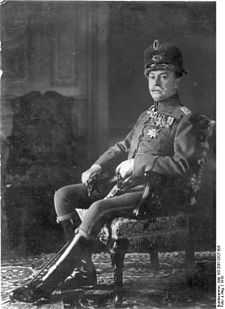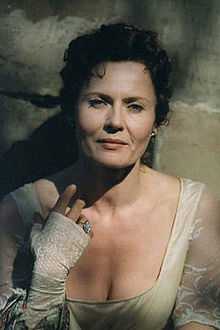Magnat (film)
| Magnat | |
|---|---|
| Directed by | Filip Bajon |
| Written by | Filip Bajon |
| Starring |
Jan Nowicki Olgierd Łukaszewicz Jan Englert Bogusław Linda Grażyna Szapołowska Alfred Struwe |
| Music by | Jerzy Satanowski |
| Cinematography | Piotr Sobociński |
Production company |
Studio Filmowe TOR |
Release dates |
|
Running time | 171 minutes |
| Country | Poland |
| Language |
Polish German Silesian |
Magnat is a 1987 Polish historical film directed by Filip Bajon.[1]
The film traces the fascinating saga of princely Polish dynasty in years 1900-1935. In 1900 Prince Hans Heinrich XV von Teuss entertains Emperor Wilhelm II with a bison hunt at his palatial residence. He finds out many years later that his wife was emperor's lover and divorces her. In the '20s, during the Silesian uprisings, Prince's son Conrad turns out to be involved in a homosexual relationship. In 1932, the Prince, now married to younger Marisca, becomes paralysed and confined to wheelchair. His diabolical elder son takes over the ruined estate and unknown to his father becomes associated with Hitler's supporters.[2]
Plot

In the year 1900 the German Emperor, Wilhelm II, was invited for a bison hunt in the hunting lodge and estate of a wealthy industrialist and businessman Prince Hans Heinrich XV (of the von Teuss family) in German-controlled Silesia. The emperor, satisfied with the diplomatic services of the Prince for the country and charmed by his young wife Daisy, offers him a profitable position. The Prince is obliged to choose: either become the Great Huntsman of the Crown and receive additional land for building new factories, coal mines and manufacturing plants or become an Ambassador in London. Although under the constant pressure of his wife to choose the position of an ambassador, Hans Heinrich becomes the Great Huntsman of the Empire. Later distressed Daisy turns to the Emperor for help in order to escape from her tyrannical, cynical and obsessed husband. Upon the Kaiser's refusal she becomes involved in a scandalous affair that would later have devastating consequences on the von Teuss family and her marriage. The Prince divorced Daisy in the 1920s.
Upon receiving the land from Wilhelm II, Hans Heinrich XV, while taking part in an event near his palace, decides to give the gained territories to his German loyal friend, court adviser and collaborator, Heinberg. Clever Heinberg, with obvious knowledge of the surrounding natural resources, decides to build a coal mine instead of keeping the forest intact and becomes the initiator of the newly established and later very successful company Heinberg Gruppe. Soon Heinberg exclaims that his ancestors have served the von Teuss family for decades and he shall be the last one to be a "slave" at his estate. The Prince, firstly shocked but later comfortable with the tight situation, made a mistake that would later cost him his entire investment in the mines and affect his involvement in the Central-Western European and global trade market. Heinberg eventually would take over his entire business.
In 1932 the workers and the administration of the von Teuss coal mine factory complex receive distressing news: they believe that the Prince is dying at his palace in Pszczyna which became part of the newly established Second Polish Republic. One of the office workers called Nelke, with all respect, believes that his death should be celebrated and by turning on the sirens he accidentally kills one of the diggers in the mine (distracted by the noise of the siren, he was crushed by a barrow). Later the entire staff blames Nelke for this and the diggers demand higher wages for the family of the deceased. The Prince, hearing the noises from the outside, states that he shall not die as more work is to be done around the industry. This worries his youngest son Bolko, that recently has fallen in love with his young stepmother Marisca.
At the same time Franzel, the eldest of the three sons visits the Heinberg Gruppe manufacturing plants in Westphalia, in Germany. He tries to collaborate with Heinberg in order to receive back the lost assets that were sold by the von Teuss family to pay the large debts. To fully gain the trust of Heinberg, Franzel gets secretly involved in Nazi affairs and takes loans from the banks of the III Reich.
Franzel and Conrad are later summoned to their father's residence to negotiate the inheritance conflict. Hans Heinrich, already paralysed and of weak health, argues that none of them should inherit such a large amount of debt therefore he decides to have another child with Marisca. This greatly angers his youngest son Bolko (already present at the residence), who is later blamed for spending all the remaining savings in casinos and other public areas. Conrad is blamed for having a homosexual relationship with Zbierski's son and cannot produce and heir and Franzel is known to be sympathetic to the Nazi policy. It is Franzel that gets chosen to be the head of the dynasty, as his father, already bound on a wheelchair, is unable to perform his duties.
Eventually after Hans Heinrich, with the help of his new loyal adviser, Manager Zbierski known as Wróżka (future-teller) and his secretary Kazimierz, found out that all of the personal saving were sent to Hitler in order to secure the reputation of the Nazi party, he removes Franzel from office and places Conrad in charge. Meanwhile Bolko is arrested in Germany and suspected of fraud.
After being released Bolko is transported to Poland and dies soon after and Franzel is excluded from the family. Following World War II Conrad, already after the death of his father, becomes the only heir to the fortune but soon realizes that all of his possessions were seized by the Polish communist government.
Reception
The filmed was praised by both domestic and foreign movie critics. Bogusław Linda received from Film Polski (The Polish Film Industry) an award in Gdynia, in 1987. Although known to be a masterpiece of the 1980s Polish cinema, the film was often criticized by the general public and some of the living members of the princely family for its historical inaccuracy.
Cast
| Role | Actor |
|---|---|
| Manager Zbierski | Jerzy Bińczycki |
| Hans Heinrich XV | Jan Nowicki |
| Marisca | Grażyna Szapołowska |
| Foreman Grela | Jerzy Trela |
| Franzel | Olgierd Łukaszewicz |
| Kazimierz | Zygmunt Bielawski |
| Heinberg | Rolf Hoppe |
| Bolko | Bogusław Linda |
| Daisy | Maria Gładkowska |
| Conrad | Jan Englert |
| Wilhelm II | Alfred Struwe |
| Gosche | Henryk Bista |
| Doctor | Ryszard Mróz |
| Mathilda | Barbara Rachwalska |
| Jolanta's guardian | Czesława Pszczolińska |
| Missy | Mirosława Marcheluk |
| Nelke | Włodzimierz Musiał |
| Alojzy | Aleksander Fogiel |
| young Conrad | Rafał Wieczyński |
| Jurek Zbierski | Marek Barbasiewicz |
Main roles
-
Jan Nowicki - Hans Heinrich XV
-
.jpg)
Olgierd Łukaszewicz - Franzel von Teuss
-
.jpg)
Jan Englert - Conrad von Teuss
-

Bogusław Linda - Bolko von Teuss
-

Grażyna Szapołowska - Marisca, Spanish-Hungarian Duchess
References
External links
- Magnat at the Internet Movie Database